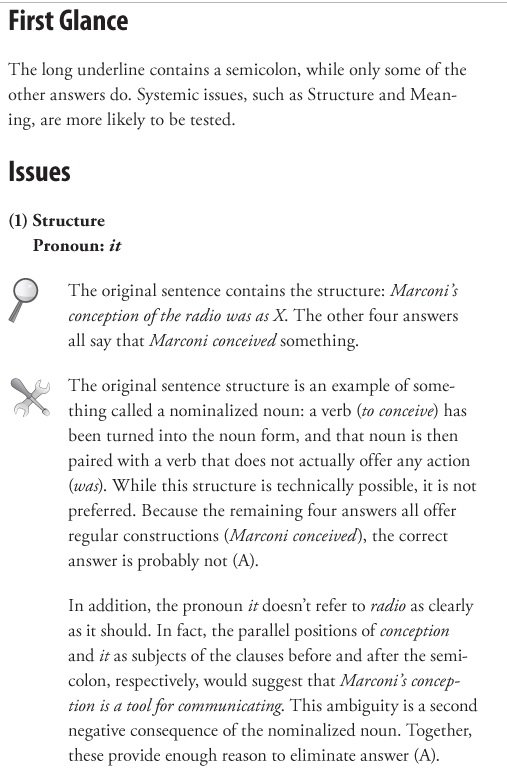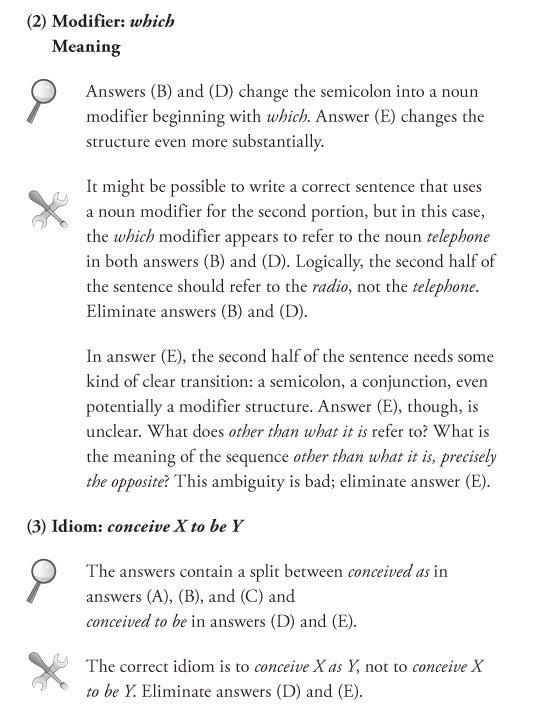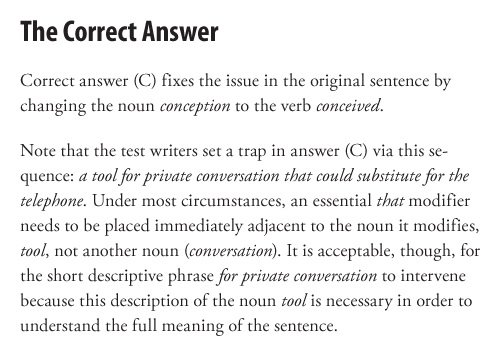Events & Promotions
|
|

GMAT Club Daily Prep
Thank you for using the timer - this advanced tool can estimate your performance and suggest more practice questions. We have subscribed you to Daily Prep Questions via email.
Customized
for You
Track
Your Progress
Practice
Pays
Not interested in getting valuable practice questions and articles delivered to your email? No problem, unsubscribe here.
- Nov 20
07:30 AM PST
-08:30 AM PST
Learn what truly sets the UC Riverside MBA apart and how it helps in your professional growth - Nov 22
11:00 AM IST
-01:00 PM IST
Do RC/MSR passages scare you? e-GMAT is conducting a masterclass to help you learn – Learn effective reading strategies Tackle difficult RC & MSR with confidence Excel in timed test environment - Nov 23
11:00 AM IST
-01:00 PM IST
Attend this free GMAT Algebra Webinar and learn how to master the most challenging Inequalities and Absolute Value problems with ease. - Nov 25
10:00 AM EST
-11:00 AM EST
Prefer video-based learning? The Target Test Prep OnDemand course is a one-of-a-kind video masterclass featuring 400 hours of lecture-style teaching by Scott Woodbury-Stewart, founder of Target Test Prep and one of the most accomplished GMAT instructors.
C
Be sure to select an answer first to save it in the Error Log before revealing the correct answer (OA)!
Difficulty:
 45%
(medium)
45%
(medium)
Question Stats:
64% (01:43) correct 36%
(01:54)
wrong
36%
(01:54)
wrong  based on 15784
sessions
based on 15784
sessions
History
Date
Time
Result
Not Attempted Yet
Marconi’s conception of the radio was as a substitute for the telephone, a tool for private conversation; instead, it is precisely the opposite, a tool for communicating with a large, public audience.
(A) Marconi’s conception of the radio was as a substitute for the telephone, a tool for private conversation; instead, it is
(B) Marconi conceived of the radio as a substitute for the telephone, a tool for private conversation, but which is
(C) Marconi conceived of the radio as a tool for private conversation that could substitute for the telephone; instead, it has become
(D) Marconi conceived of the radio to be a tool for private conversation, a substitute for the telephone, which has become
(E) Marconi conceived of the radio to be a substitute for the telephone, a tool for private conversation, other than what it is,
OG16 SC113
Category: Rhetorical construction; Logical predication

01.jpg [ 119.72 KiB | Viewed 139093 times ]

02.jpg [ 114.03 KiB | Viewed 139166 times ]

03.jpg [ 63.03 KiB | Viewed 138951 times ]
(A) Marconi’s conception of the radio was as a substitute for the telephone, a tool for private conversation; instead, it is
(B) Marconi conceived of the radio as a substitute for the telephone, a tool for private conversation, but which is
(C) Marconi conceived of the radio as a tool for private conversation that could substitute for the telephone; instead, it has become
(D) Marconi conceived of the radio to be a tool for private conversation, a substitute for the telephone, which has become
(E) Marconi conceived of the radio to be a substitute for the telephone, a tool for private conversation, other than what it is,
OG16 SC113
Category: Rhetorical construction; Logical predication
Attachment:
01.jpg [ 119.72 KiB | Viewed 139093 times ]
Attachment:
02.jpg [ 114.03 KiB | Viewed 139166 times ]
Attachment:
03.jpg [ 63.03 KiB | Viewed 138951 times ]
Kudos
Bookmarks
This is another question that’s at the top of my list of the most unsatisfying official GMAT SC questions ever produced.
I’ll be honest: my first instinct is to eliminate the correct answer because of pronoun ambiguity, but that’s a bad idea: pronoun ambiguity is not an absolute rule on the GMAT (more on that in this video), and there are far worse errors in the other answer choices.
And that’s classic GMAT right there: there aren’t a ton of absolute RULES that ALWAYS apply on the GMAT, but it’s always true that you’ll want to eliminate the four worst answer choices. Whatever you’re left with might not be great, but it’ll be correct enough.
Of course, “it” logically needs to refer to “radio.” So we definitely have a pronoun ambiguity situation on our hands, but pronoun ambiguity isn’t an absolute crime. So I wouldn’t eliminate (A) based only on the pronoun issue.
But there’s also a meaning issue with (A): “Marconi’s conception… was as a substitute for the telephone…” Wait, no. Logically, the radio is the substitute for the telephone – the “conception of the radio” definitely is not the substitute.
So I’m not 100% comfortable eliminating (A) based on the pronoun ambiguity alone, but the logical problem at the beginning of the sentence gives us a reason to ditch (A) with confidence.
Nope. It’s the radio that's the tool for communicating with a large, public audience – not the telephone. If we switched “which” to “it” (or “instead it”), then we might be OK, but (B) in its current form just doesn’t make sense.
And the thing is, I don’t see any other problems. The modifier “that could substitute for the telephone” seems to correctly modify “tool for private conversation.” I’m OK with the verb tense at the end of the underlined portion of the sentence: “[the radio] has become a tool for communicating with a large, public audience.” Sure, I guess we could say that the radio started to become a tool for mass communication long ago, and continues to become a tool for communicating with a large, public audience.
Honestly, I’d be happier picking an answer choice that doesn’t have the pronoun ambiguity problem, but ONLY IF that answer choice doesn’t have more severe problems. (C) at least makes sense, and the pronoun ambiguity isn’t enough to eliminate it. So let’s keep the little booger for now.
And for whatever it’s worth, “conceived… to be” is not the correct idiom. It should be “conceived… as.” But don’t lose too much sleep over idioms, since there are around 25,000 of them in English.
Anyway, (D) is out.
Huh? “Other than what it is”? That’s a mess, and the contrast isn’t clear between Marconi’s conception of the radio and what it actually is: (C) much more clearly states that the radio is instead a tool for mass communication.
So (E) is gone, and we’re left with (C). So pronoun ambiguity isn’t ideal, but it’s not automatically your enemy, either.
I’ll be honest: my first instinct is to eliminate the correct answer because of pronoun ambiguity, but that’s a bad idea: pronoun ambiguity is not an absolute rule on the GMAT (more on that in this video), and there are far worse errors in the other answer choices.
And that’s classic GMAT right there: there aren’t a ton of absolute RULES that ALWAYS apply on the GMAT, but it’s always true that you’ll want to eliminate the four worst answer choices. Whatever you’re left with might not be great, but it’ll be correct enough.
Quote:
That “it” jumps out at me right away. It just doesn’t seem awesome: “it” could refer to “conversation” or “tool” or “telephone” or “substitute” or “radio” or “conception of the radio.” Actually, since “it” is the subject of the second full clause in the sentence, that pronoun most likely refers to the subject of the first full clause, “Marconi’s conception of the radio.” (Again, more on these pronoun issues in this video.)
Of course, “it” logically needs to refer to “radio.” So we definitely have a pronoun ambiguity situation on our hands, but pronoun ambiguity isn’t an absolute crime. So I wouldn’t eliminate (A) based only on the pronoun issue.
But there’s also a meaning issue with (A): “Marconi’s conception… was as a substitute for the telephone…” Wait, no. Logically, the radio is the substitute for the telephone – the “conception of the radio” definitely is not the substitute.
So I’m not 100% comfortable eliminating (A) based on the pronoun ambiguity alone, but the logical problem at the beginning of the sentence gives us a reason to ditch (A) with confidence.
Quote:
This is such a confusing mess that it’s hard for me to explain why it’s a confusing mess. The whole problem is “but which is”, a phrase that seems to be (awkwardly) referring to the telephone. But that doesn’t make sense: “the telephone… but which is precisely the opposite, a tool for communicating with a large, public audience.”
Nope. It’s the radio that's the tool for communicating with a large, public audience – not the telephone. If we switched “which” to “it” (or “instead it”), then we might be OK, but (B) in its current form just doesn’t make sense.
Quote:
Like (A), (C) has some potential pronoun ambiguity: “it” would refer to “the radio” or “private conversation” or “substitute” or “telephone.” But again: pronoun ambiguity is NOT automatically wrong on the GMAT. And in this case, I think you could argue that the “it” isn’t even all that confusing.
And the thing is, I don’t see any other problems. The modifier “that could substitute for the telephone” seems to correctly modify “tool for private conversation.” I’m OK with the verb tense at the end of the underlined portion of the sentence: “[the radio] has become a tool for communicating with a large, public audience.” Sure, I guess we could say that the radio started to become a tool for mass communication long ago, and continues to become a tool for communicating with a large, public audience.
Honestly, I’d be happier picking an answer choice that doesn’t have the pronoun ambiguity problem, but ONLY IF that answer choice doesn’t have more severe problems. (C) at least makes sense, and the pronoun ambiguity isn’t enough to eliminate it. So let’s keep the little booger for now.
Quote:
(D) has nice, clear problems. The modifier beginning with “which” is just plain wrong: “which has become a tool for communicating with a large, public audience” seems to modify “the telephone”, and that makes no sense at all.
And for whatever it’s worth, “conceived… to be” is not the correct idiom. It should be “conceived… as.” But don’t lose too much sleep over idioms, since there are around 25,000 of them in English.
Anyway, (D) is out.
Quote:
For starters, we have the same idiom problem as in (D). But then there’s just a messy construction later in the sentence: “Marconi conceived of the radio to be a substitute for the telephone…., other than what it is, a tool for communicating with a large, public audience.”
Huh? “Other than what it is”? That’s a mess, and the contrast isn’t clear between Marconi’s conception of the radio and what it actually is: (C) much more clearly states that the radio is instead a tool for mass communication.
So (E) is gone, and we’re left with (C). So pronoun ambiguity isn’t ideal, but it’s not automatically your enemy, either.
Kudos
Bookmarks
D and E gone because of wrong idiom, -conceived of to be -
A gone because of -conception of as -
B is gone because of very ambiguous reference of - which - . -Which - should point to the radio as per the essence of the passage, but here, seems to point to the telephone or the conversation or a tool, every thing other than the radio.
C is the lone winner
A gone because of -conception of as -
B is gone because of very ambiguous reference of - which - . -Which - should point to the radio as per the essence of the passage, but here, seems to point to the telephone or the conversation or a tool, every thing other than the radio.
C is the lone winner













